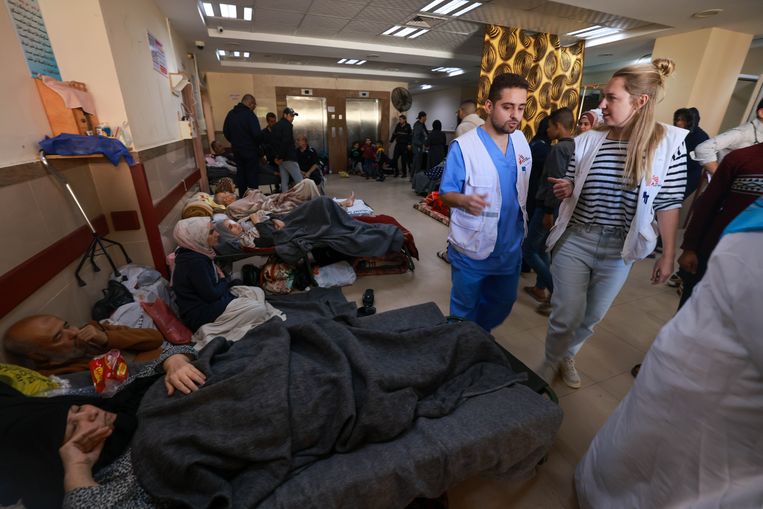‘This is unprecedented.’ Emergency nurse Katrien Claeys has just returned from the Gaza Strip. She sent a team from Doctors Without Borders with around 70 local health workers. “There is simply not a meter safe in Gaza.”
33-year-old Katrien Claeys from Bruges is an emergency nurse but has been working full-time at Doctors Without Borders for several years. Plenty of experience, Claeys has led NGO medical teams in Yemen, Ethiopia, and a dozen other countries. But nothing beats what she saw in five weeks in the Gaza Strip.
“The big difference with other conflicts is that people do not have the opportunity to flee to a safe place,” she says. “A supposedly safe zone is sometimes bombed a week later. There is simply not a meter safe in Gaza. Unseen.”
The mission started in October with four weeks of nail-biting in Egypt waiting for clearance. Once across the border, the team went to the Nasser Hospital in Khan Younis, where it analyzed the greatest needs and started a project.
Was that possible in safe conditions?
“In the first two weeks in Khan Younis there were also bombings in the neighborhoods around the Nasser hospital, but after the ceasefire this increased enormously. We stopped the project there because it was too unsafe. A few days later the maternity ward was bombed.
“We also supported a health center in Khan Younis, which we had to leave after ten days following an evacuation order. That’s a terrible thing to do. A medical facility should never be a target. We then moved to the center of the Gaza Strip, to Al Aqsa Hospital in Deir al Balah. We worked there for three weeks until a new team arrived.”
Israel says Hamas uses hospitals as military posts. Did you notice anything about that?
“Not at all. All we saw were patients. There were children who were the only ones left in a family of 60 people. There they are: be and also suffer a skull fracture or other injury. The number of minors was enormous. Let me cite the figures: 25 percent of the patients who received wound care from us were younger than 15 years old. And at the health center in Khan Younis, half of the patients were under 5 years old.”
Did that center focus mainly on children?
“No, the living conditions are simply very bad. There are many children with diarrhea, pneumonia or skin conditions, such as scabies and bacterial infections.”
What was the situation like in Al Aqsa Hospital?
“Normally there is room for 250 beds, now there were 750. These are only patients with injuries from bombings. There is no longer room for other patients, with heart disease, cancer or pregnancy. Primary health care has been abolished. This concerns limb amputations, burns, head injuries, broken vertebrae, those kinds of traumas.
“The worst thing is what we didn’t see: the people who can’t get there, for example because they are under the rubble. Several times a day there was a ‘mass casualty’, with many wounded people coming in at the same time, after heavy bombardments.
“Patients were lying everywhere, on beds or on the floor, in the corridor or even outside the hospital. When we arrived the hospital was no longer managing wound care. The smell in the corridor and in the ward was unbearable, due to rotting limbs, sometimes with worms and dead flesh.”

Due to a lack of care?
“Yes, due to the abundance of patients and the lack of material and organization. It is far from the Rafah border crossing, so food and other supplies are difficult to get there. Monitoring patients is also immensely difficult if they are scattered everywhere.
“We set up a wound care tent where patients from inside and outside the hospital could go. We did about 150 wound treatments there per day. We have also opened an operating room for painful wound care under general anesthesia.
“A team of psychologists organized sessions that were mainly aimed at children and their parents. We were a team of three international colleagues from Doctors Without Borders and seventy nurses and doctors from the Gaza Strip, who previously also worked for our organization. Most of them were health workers who had fled from the north.”
You worked days from 6am to midnight. It must have been extremely difficult, or are you able to cut yourself off from the emotional side of things?
“No, you are confronted with loss all the time, not only with patients, but also with staff who suddenly receive bad news. I remember one day we started by comforting a nurse. She had just received a video showing that her sister had died. That was the daily reality. The streets and neighborhoods around the hospital were bombed. I worked with 60 to 70 employees and every day I had to see who was there and who was not. Who didn’t survive the night? Whose house was hit?”
I suspect that you were also relieved when you were back in Egypt to return to Belgium?
“No, I wouldn’t call it relieved, because our work there is so important. Plus it’s hard because you know 2 million other people can’t leave. On the way back to Rafah I saw nothing but rubble, it was apocalyptic. People live in tents or schools, in total desperation, all hope lost and only concerned with survival.”


